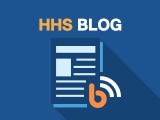Calling All Innovators: HHS Announces Healthy Behavior Data Challenge
If someone asked you how well you ate yesterday, would you be able to respond accurately? Let’s say you ate a salad. It may seem simple, but have you ever really thought about what and how much you add to it? You may be piling on more calories than you realize or intended. You start with a healthy base: some leafy greens, a spring mix or spinach. It’s the decisions you make when topping the salad that can make a big difference; cherry tomatoes, avocado, a hard-boiled egg, some peppers, and finally salad dressing.
Typically, people don’t measure out the toppings of their salad – they grab the spoon from the buffet and scoop in what looks good to them. For example, a typical serving size for salad dressing is about two tablespoons, but rarely does someone pull out a measuring spoon to check. It is easy and common to track serving sizes inaccurately. Not only nutrition, but physical activity, sleep, and sedentary behavior are some of the many risk factors that are collected by States and the U.S. Centers for Disease Control (CDC) in the annual Behavioral Risk Factors Surveillance System. This is the same system that helped track the obesity epidemic over the past several decades.
Good public health surveillance demands that we work to get valid and reliable data that accurately represents our populations of interest. Traditionally, the collection of health data through surveillance modes includes telephone and in-person interviewing. This is becoming increasingly challenging and costly with declines in participation and even changes in personal communications. Most significantly, we have major limitations since self-reported data are subject to under or over reporting and recall bias.
Fortunately, we have entered an age where we are awash in new data sources from our smart phones, maps, administrative data or other sources that we haven't even considered. Our challenge is to find the methods needed to make this data better than the current method of simply asking people.
That’s why the U.S. Department of Health and Human Services (HHS) is excited to announce The Healthy Behavior Data Challenge. This challenge calls for new ways to address the limitations of self-reported health surveillance information and taps into the potential of innovative data sources and alternative methodologies for public health, such as wearable devices, mobile applications, and social media.
The Public Health Agency of Canada will also conduct a similar challenge concurrently. This will enable the two countries to collaborate and learn from their challenges and leverage the data.
In phase I of the challenge, participants will compete for six individual $5,000 prizes. Participants will develop a concept proposal for obtaining data collected from wearable devices, mobile apps, or social media to enhance traditional systems in the areas of physical activity, sedentary behaviors or sleep for example. The deadline for submissions is August 4, 2017.
In phase II, the phase I finalists will advance to compete for a $70,000 prize pot, with the first place winner receiving $40,000, the second place winner $20,000, and the third place winner $10,000. Finalists will also get the chance to test their proposed approaches for ongoing public health surveillance. The Phase II submission period begins October 2, 2017 and end January 15, 2018. The final winners will be announced in March 2018.
For more information on the Healthy Behavior Data Challenge visit: https://www.challenge.gov/challenge/the-healthy-behavior-data-challenge/
Calling all innovators! #HHS announces The Healthy Behavior Data Challenge. Learn more. https://go.usa.gov/xNvcr via @HHSGov
Sickle Cell Disease in the Emergency Department
#IAmHHS: Advocating for People with Disabilities
